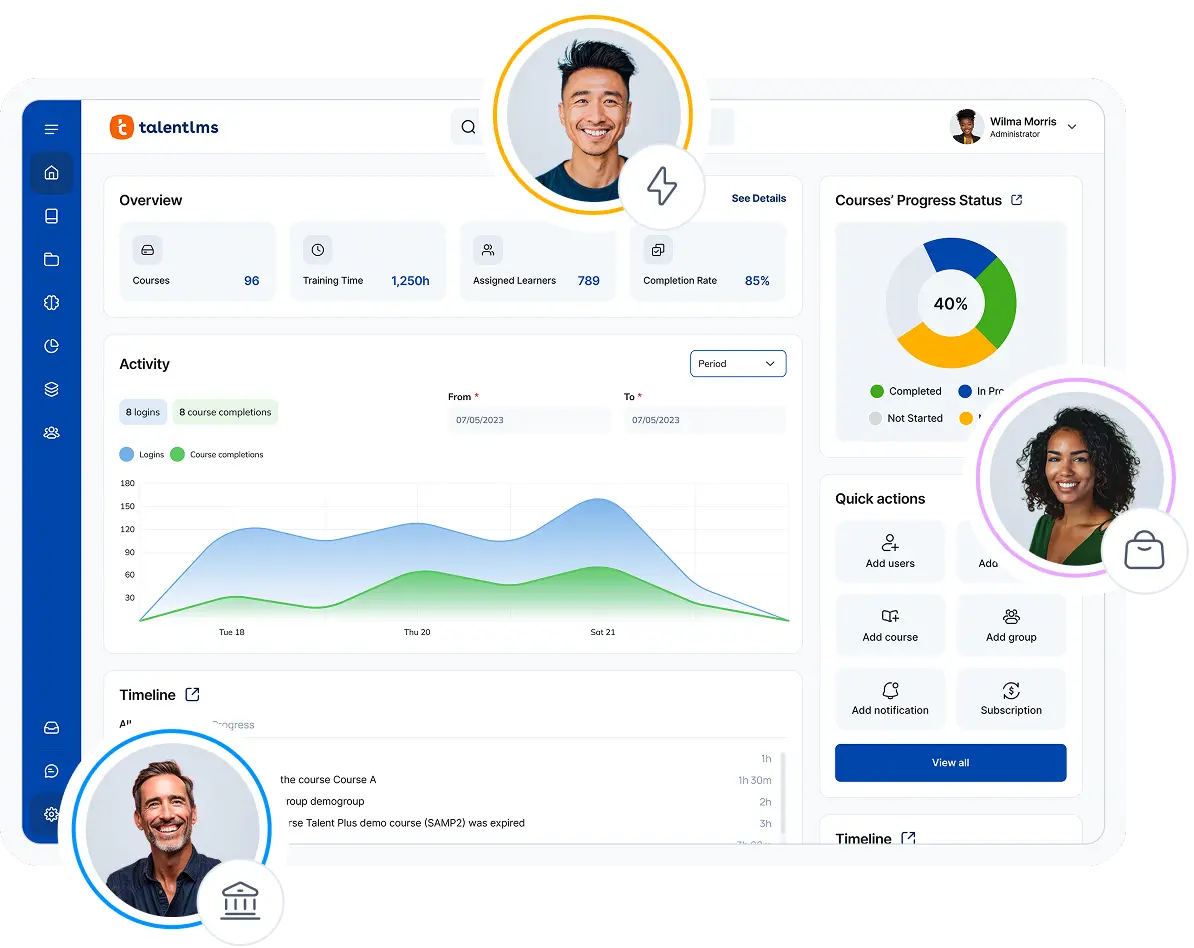A new manager joins the team. Perhaps they’re a star performer who’s just been promoted or even one brought in from the outside.
Either way, there’s a good chance the specific skills that got them the job aren’t the ones that’ll help them succeed. Every new leadership role forces a difficult adjustment, whether it’s learning to manage people for the first time or adapting to a new company culture.
New manager training programs are designed to equip employees with the essential skills and knowledge needed to effectively lead teams and contribute to business goals. It focuses on developing leadership, communication, and performance management capabilities. Such training can be formalized by a company or pursued independently by managers, but a systematic approach promises that all leaders are equally prepared.
Leaving this development to chance creates inconsistent leadership and preventable problems down the road.
What follows is a new manager training checklist to help them thrive.
Key manager training topics based on must-have skills
The most effective training programs build a new identity for managers via three learnable pillars, which are developing a leadership identity, mastering communication, and learning to truly connect with a team.
Leadership development
A foundational topic for new manager training courses is situational leadership, which teaches them that real leadership qualities are about influence.
Daniel Goleman’s Six Leadership Styles provides a practical framework for this lesson. The stakes are high, since Gallup research shows managers account for 70% of the variance in team engagement.
Communication skills
Another core topic is mastering high-stakes communication. New managers often dread giving constructive feedback, the most common form they’ll need to use in this role.
A framework like Kim Scott’s “Radical Candor” gives a powerful guide for these moments. It teaches managers how to care personally while challenging themselves directly, turning a feared conversation into a tool for growth.
Delegation and decision-making
The third topic is teaching delegation and confident decision-making.
Training should frame delegation as an act of empowerment that boosts job satisfaction, a link shown in research from the University of La Verne. To build confidence in their own calls, a simple model like the OODA loop (Observe, Orient, Decide, Act) gives managers a clear process to follow under pressure.
Performance management
Effective performance management training programs are a must-have for new manager training courses.
A great system to teach is the Objectives and Key Results (OKR) framework, which was pioneered at Intel and made famous by Google. It gives managers a simple way to align their teams around clear, forward-looking goals and have productive conversations about progress.
It also equips them with a host of employee evaluation comments they can deliver to make the experience feel more personal.
Conflict resolution
Another advanced topic is systematic conflict resolution. New managers often either ignore conflict until it explodes or handle it clumsily, making things worse.
The Thomas-Kilmann Conflict Mode Instrument (TKI) gives them a sophisticated map for these situations. It outlines five distinct ways to handle a dispute, like collaborating or compromising, helping a manager intentionally choose a path instead of just reacting.
Change management
Managers need training in leading people through change. Their job is to be a transition guide who can manage the human and emotional journey their team experiences.
Prosci’s ADKAR model offers a simple roadmap for this, breaking the change process into five individual stages like Awareness and Desire. Achieving those early stages depends entirely on the candid management skills mentioned earlier.
Time management
Many new and experienced managers need help with structuring their time and the team’s time with intention.
Frameworks like the Eisenhower Matrix help them distinguish between the truly important and the merely urgent. Understanding concepts like “Maker vs. Manager” schedules also helps them protect their focus for deep work.
Coaching and mentorship
A manager’s role eventually evolves from being the team’s best problem-solver to becoming its best coach.
Learning a structured framework like the GROW model helps them build their team’s own problem-solving skills instead of just giving answers. They can guide conversations through goals and options, often using powerful questions like the “Five Whys” to get to the root of an issue.
Business acumen
Beyond management skills training, the final step in a manager’s career development is building true business acumen.
A new manager who can read a P&L statement or explain the company’s go-to-market strategy can answer their team’s “why” questions with genuine authority.
Benefits of manager training
The investment in first time manager training pays off in a chain reaction. It starts with the individual leader and ripples outward to their team, the culture, and the company’s bottom line.
Keeps your managers from leaving
According to TalentLMS research, 92% of managers said that training is very important to them, and it’s a big driver for them sticking around in a company for more than 3 years.
A lower manager turn-over rate directly affects your business in many ways. Current employees often get comfortable with their current manager, and new managers can take time to get used to. It also impacts your bottom line as you’ll need to spend more money training or sourcing new managers.
Enhanced leadership skills
The most immediate return from training is the growth of the manager’s own creative leadership abilities.
They learn to speak with both clarity and empathy using specific frameworks. Research from firms like Zenger Folkman directly links this kind of effective coaching and communication to higher levels of team engagement.
Improved team performance
A manager who communicates and manages well can unlock higher performance and engagement from their entire team.
The business impact is clear in Gallup’s research, which shows that highly engaged teams drive 21% greater profitability.
Positive work environment
The cycle of great leadership and strong performance fosters a healthier work culture.
It creates an atmosphere of psychological safety, a concept from Harvard’s Amy Edmondson, where people feel safe enough to collaborate and take smart risks.
Increased productivity
A positive environment directly impacts the bottom line.
A University of Oxford study, for instance, found that happy employees are 13% more productive. Managers also know how to inspire underperforming employees, which also impacts business productivity.
Career advancement
A healthy culture driven by great managers encourages people to build careers, not just hold jobs.
Doing so directly combats the high cost of turnover, which sources like SHRM estimate can be up to twice an employee’s annual salary.
Challenges new managers face
The most profound challenge for a new manager is often the disorienting shift in their professional identity from “peer” to “boss.” The change can trigger intense feelings of imposter syndrome, a struggle that is especially common, as a KPMG study found 75% of female executives have experienced it.
The imposter syndrome is often compounded when managers don’t review adequate training. In fact, 71% of employees believe their managers need upskilling or reskilling, which can make the employees undermine their managers and make them feel like an imposter.
Another challenge they often face is distinguishing between manager vs leader. Often you want them to have a mix of these two roles, being inspirational leaders that get their hands dirty, while also managing resources and time.
A new title can also bring a deep sense of isolation. Managers often feel caught in the middle, no longer truly part of the team they lead, but not yet fully integrated with their new leadership peers.
New managers also struggle with a strange productivity paradox. They often try to keep doing their old “doer” job on top of their new duties, leading to longer hours but a feeling of decreased personal output.
On top of these personal struggles, they rarely start with a clean slate. They often inherit unresolved team conflicts, tricky dynamics, or performance issues left behind by the previous manager.
The combination of fear and pressure often manifests as the destructive habit of micromanagement. It’s a common reaction that has a huge impact, with one Trinity Solutions study finding that 69% of employees have considered leaving their job because of it.
How to help new managers succeed
To help new managers succeed, the best organizations build a complete ecosystem of support to guide managers through their difficult first year.
The foundation of this ecosystem is a formal training program that equips them with the practical skills and top soft skills they need. Classroom learning is best reinforced through a dedicated mentorship program that pairs the new manager with a seasoned company leader.
You can also give their first few months structure by following a clear onboarding plan. Michael D. Watkins’s book, The First 90 Days, is the gold standard for this, offering a roadmap for navigating professional transitions.
To combat the isolation many new managers feel, you can create peer support groups. These new manager cohorts can meet regularly to share struggles and exchange advice in a safe, supportive environment.
Finally, the organization must clearly define what organizational success looks like for its managers. Looking beyond simple team output to metrics like employee engagement scores and retention rates gives new emerging leaders a clear target and a way to measure their growth.
 Gary Cookson
Gary Cookson
EPIC
Gary has more than 20 years of experience in strategic and operational HR, Learning and Development (L&D), and Organization Development (OD).
Emotional Intelligence Beats Expertise in Early Leadership
My mum once told me that success in life comes not from what you know, but who you know. As a child I laughed at this, but later in life and particularly my career I’ve come to realise she was right.
A manager can often believe that they should know more than their direct reports and teams. It’s a natural reaction to becoming a new manager. But far more important than that is knowing those direct reports and teams – what motivates them, what worries them, what frustrates them and what delights them / both in and outside of work.
As a new manager you should focus on your interpersonal skills and emotional intelligence, and not on measuring and displaying one’s own knowledge. Get to know your people, and then the performance could take care of itself.
Tips for new managers
After teaching new managers the formal frameworks, the most effective training programs, you then show them how to use their tools. The following are the core, teachable habits and tips that turn leadership training into effective daily practice.
Build relationships
The curriculum should equip new managers with the essential skills to build relationships from their first day. Teach them to schedule dedicated one-on-ones with no agenda other than asking powerful questions like, “What does great support from a manager look like to you?”
The purpose of these conversations is to build a foundation of psychological safety. It shows the team that their new manager is there to support them, not just supervise them.
Set clear expectations, then step back
Equip new managers with a tangible tool, like a “team charter” template, for setting clear expectations. They can use this immediately to work with their teams to define goals and communication norms.
Emphasize in the training that the collaborative process of creating the charter is as valuable as the document itself. The process builds shared ownership over the team’s success.
Once they have set clear expectations with their team, they should step back and let the team members figure it out for themselves.
Delegate tasks and authority
Training must move from “how to delegate tasks” to “this is an act of giving employees development opportunities.” Teach new managers to always explain why they chose a specific person for a task, linking the work to that employee’s skills.
The curriculum should also instruct new managers to schedule a “debrief” after the task is done. The debrief can focus on what the employee learned from the experience.
Seek feedback
New manager training courses should teach them how to ask for feedback in a way that generates useful advice. Teach them to use a “Start, Stop, Continue” framework and to ask about specific situations, not generalities.
The curriculum must also cover how to receive that feedback. Teach new managers to listen without defending and to always thank the person for their candor, which encourages honesty in the future.
Practice active listening
Your program must teach active listening as a practical skill, not just a concept. Include modules that train managers to paraphrase for understanding and to listen for the emotional subtext in a conversation.
The goal is to make employees feel genuinely seen and heard. That feeling is a primary driver of engagement and loyalty, and it prevents small misunderstandings from becoming larger problems.
Be transparent
The training can use role-playing scenarios to help new managers practice transparency in difficult situations. An exercise like this helps them build the habit of proactively sharing the “why” behind decisions.
The ultimate point of this practice is to cultivate authenticity. It teaches new managers that effective leadership isn’t about having all the answers, but about being honest on the journey.
Be open to feedback
Managers are used to giving feedback, but they rarely think about it flowing the other way. The truth is, they can’t grow as leaders without being open to feedback, especially from the people they manage.
Feedback should be a two-way street. Make sure to set aside time in 1:1s not just to share feedback, but to receive it. And act on what you hear. Feedback that goes nowhere quickly loses its value, so managers should show their teams that input matters by following through.
Resist micromanaging
Equip new managers with mental models to resist the urge to micromanage. Teach them the concept of “commander’s intent” and the simple self-coaching question: “Am I adding value, or just my preference?”
The training should also explain the corrosive effect of micromanagement. The habit sends a message of “I don’t trust you,” which destroys the very confidence a manager is supposed to build.
Empower your team
Teach empowerment through a simple, memorable rule known as the “manager as a shield.” The training should instill the habit of giving their team public credit for all successes and taking private responsibility for all failures.
The next step in empowerment is teaching managers to grant their teams real autonomy. True empowerment means giving them the authority to make decisions within their defined scope.
 Marialena Kanaki
Marialena Kanaki
Strategic Content Marketing Leader with a strong record of shaping brand narratives and driving growth through creative storytelling. Experienced in managing high-performing teams, building impactful content strategies, and bridging business goals with authentic, human-centered communication. Dedicated to turning vision into execution and empowering others to achieve success with clarity and impact.
Expert Tip: The Mindset Shift That Makes or Breaks New Managers
Good management is more about people than processes. The hardest part? Letting go of being the one who does the work best and becoming the one who helps others do their best. That mental leap is where most new managers get stuck.
- Shift from doing to directing: You’re no longer measured by what you produce. You’re measured by how well your team performs. Stop jumping in to fix things. Start clarifying, delegating, and stepping back.
- Judge the work, not the energy: Someone being loud in meetings doesn’t mean they’re contributing. And someone who’s quiet isn’t necessarily struggling. Track actions. That’s what counts.
- Get comfortable being uncomfortable: Hard conversations will feel awkward at first. That’s normal. Your job isn’t to avoid discomfort. It’s to create enough safety so it leads to progress instead of shutdown.
- Act like a manager even when you don’t feel like one: You’ll overthink decisions and question your authority. Separate choices that need deep thought from ones that just need a decision. Overthinking is a trap. Make the call. If it’s wrong, fix it. But don’t sit still.
Takeaway: Great managers aren’t born. They’re made by people who adapt their skills to focus on developing others instead of perfecting their own work.
Build a leadership pipeline
Helping a single new manager find their footing is a good start. Building a system that consistently turns your best people into effective leaders is how you secure your company’s future.
Treating manager development as a system creates a compounding return on your talent. You begin to build what business thinkers like Ram Charan call a “leadership pipeline,” a continuous flow of capable leaders ready to guide the company forward.
The practical question then becomes one of scale. How do you deliver a high-quality, consistent development experience to every new manager skills development across all departments and locations?
Building that pipeline at scale requires the right platform. A powerful learning management system (LMS) is the engine for the whole process. It lets you give training, track how well you’re doing, and make sure every manager gets the help they need to grow.
Originally published on: 16 Jul 2024 | Tags: leadership,managers training,People management






